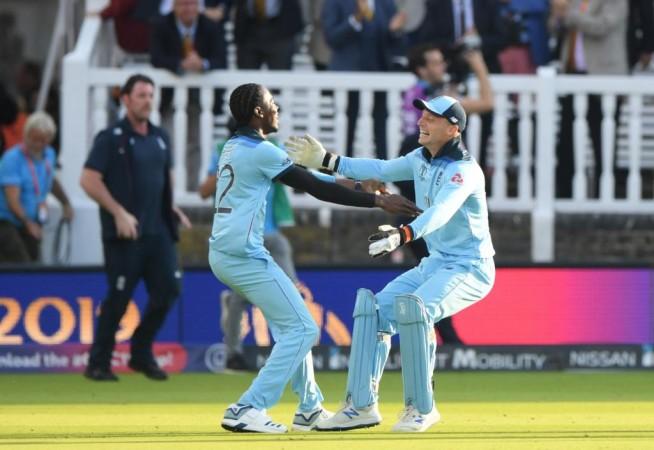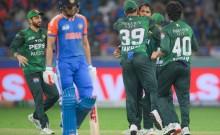
This turned out to be not just the greatest World Cup final of all time but one of the greatest, if not the greatest ODI match of all time. The twists and turns, ebbs and flows of this game were more thrilling than what even the most adept writer of thrillers could conjure up at the height of his creativity.
It essentially came down to Ben Stokes, a New Zealand born Englishman fighting to keep his team in the match and moving onwards to World Cup glory. England seemed headed for defeat when their captain Eoin Morgan was out thanks to a magnificent catch in the deep by Lockie Ferguson and the scoreboard read 86/4.
But then Jos Buttler, the most remarkable English ODI batsman of all time, teamed up with Stokes to develop one of the best partnership of the World Cup. Since the required run rate wasn't very high, there wasn't much risk-taking. They took singles and twos and put away the bad delivery and once Buttler was in and close to his 50, he started to play some of those outrageous strokes which make him special.

Because of their partnership, the required run-rate didn't get out of control and remained under 7/over. But after getting to his fifty, he wanted to take control of the game fully and in attempting a big stroke, he gave his wicket away. Tim Southee, the substitute on the field took a brilliant catch.
This opened the floodgates as wickets started falling at one end but Stokes, the fighter that he is, wasn't going to give up. He kept fighting and eventually got his team into a situation where they needed 34 off 3 overs. In the 48th over, the match seemed over when Stokes went for a big hit and the ball seemed to be heading towards Trent Boult at wide long-on. He took the catch but didn't realise how close he was to the boundary. He took one step back and stepped on the rope. Martin Guptill was close to Boult and if only the latter could have thrown the ball to him, New Zealand would have secured the World Cup there and then. But Stokes survived.

Eventually, it came down to 15 off the last over and Stokes was on strike. The first two deliveries were good yorkers and Stokes didn't take the single. Just when the World Cup was about to go out of reach of England, Stokes got on his knee and smashed a six over midwicket. The next ball saw one of the biggest instances of bad luck ever to afflict a team. Stokes mistimed a full-toss to deep midwicket and was coming back for the second run and had to dive. The throw hit the bat of diving Stokes and went past the wicket-keeper for four, in effect giving England another six. Now, 3 was needed off 2. Stokes hit the next ball down to long-off and was determined to come back for the second run. But Adil Rashid was run out at the non-striker end. So, 2 was needed off 1. Stokes bunted the next delivery to long on and set off for another brace.
But Trent Boult kept calm at the non-striker's end and collected the throw and disturbed the bails to make it a tie and create the first-ever super-over in ODI cricket history.
Stokes was made to walk out again to resume from where he left off along with Buttler and they got to 15 thanks to a good boundary from, who else, Stokes and some other good shots. New Zealand needed to get at least 16 because another tie would have meant that England take the cup as they had hit more boundaries in their innings.
Jimmy Neesham and Martin Guptill came out to chase the target and when Neesham flicked Jofra Archer over the leg side for six, it seemed the Kiwis were once again on their way to glory. However, Archer, the new kid on the block and given a huge responsibility just a couple of months after making his international debut held his nerve. From 7 off 4, it came down to 3 off 2. Then came a single which gave the strike to Guptill who had a World Cup to forget till then. He could have overcome all his failures by just getting the two runs needed off the last ball but Archer bowled another good near-yorker and Guptill could only push it to the leg side and both batsmen, realising they had to get back for the second run charged but fell short and England finally had the cup they had been wanting for a long time.


![T20 World Cup 2026: Mukesh Ambani offers snacks to Rohit Sharma; cricketer denies; Suryakumar Yadav leaves toss, runs to meet Rohit Sharma [Watch highlights] T20 World Cup 2026: Mukesh Ambani offers snacks to Rohit Sharma; cricketer denies; Suryakumar Yadav leaves toss, runs to meet Rohit Sharma [Watch highlights]](https://data1.ibtimes.co.in/en/full/828207/t20-world-cup-2026-mukesh-ambani-offers-snacks-rohit-sharma-cricketer-denies-suryakumar-yadav.jpg?w=220&h=135&l=50&t=40)











![T20 World Cup 2026: Mukesh Ambani offers snacks to Rohit Sharma; cricketer denies; Suryakumar Yadav leaves toss, runs to meet Rohit Sharma [Watch highlights]](https://data1.ibtimes.co.in/en/full/828207/t20-world-cup-2026-mukesh-ambani-offers-snacks-rohit-sharma-cricketer-denies-suryakumar-yadav.jpg?w=220&h=135)


